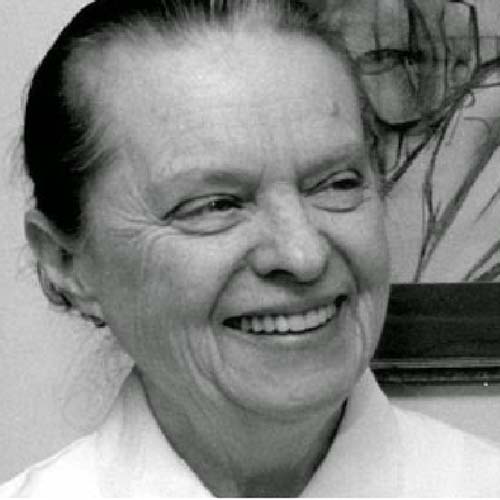Visiting Poets
Marie Ponsot
Marie Ponsot’s verse is both naked and refined, and frequently darts off in unexpected directions. The San Francisco Chronicle described her as “one of the most elegant, intelligent poets around.”
Ponsot’s first book was published in the legendary City Lights series the same year as Ginsberg’s Howl. As a result, the book didn’t receive the attention it deserved, and she was initially seen as a Beat poet, when in truth she’s more a metaphysical poet, and writes in difficult forms like the villanelle, the sestina, and the tritina. She is known for verbal precision and syntactic complexity. And while she admits it may sound “unfashionable,” her poems “are meant to be beautiful.”
Ponsot has always been fiercely independent. Decades passed between the publication of Ponsot’s first and second books; in the interim she was busy translating thirty-seven books from French and single-handedly raising seven children. Since then, she has published three more collections, including The Bird Catcher, winner of the National Book Critics Circle Award, and new and selected poems, Springing, and gained wide acclaim. Other honors include the Delmore Schwartz Memorial Prize, and the Shaugnessy Medal of the Modern Language Association.
Poet and critic William Logan observed that Ponsot “finds more drama in spending a day at the beach, or telling a story to some sleepy youngsters, than most poets could in the fall of Troy.” Earthy and erudite, sprightly and wise, at 82 this native New Yorker is finally receiving her due.
Select Poems
I don’t know what to say to you, neighbor,
as you shovel snow from your part of our street
neat in your Greek black. I’ve waited for
chance to find words; now, by chance, we meet.
We took our boys to the same kindergarten,
thirteen years ago when our husbands went.
Both boys hated school, dropped out feral, dropped in
to separate troubles. You shift snow fast, back bent,
but your boy killed himself, six days dead.
My boy washed your wall when the police were done.
He says, “We weren’t friends?” and shakes his head,
“I told him it was great he had that gun,”
and shakes. I shake, close to you, close to you.
You have a path to clear, and so you do.
From SPRINGING-NEW AND SELECTED POEMS (Knopf, 2002)
Heart, you bully, you punk, I’m wrecked, I’m shocked
stiff. You? you still try to rule the world-though
I’ve got you: identified, starving, locked
in a cage you will not leave alive, no
matter how you hate it, pound its walls,
& thrill its corridors with messages.
Brute. Spy. I trusted you. Now you reel & brawl
in your cell but I’m deaf to your rages,
your greed to go solo, your eloquent
threats of worse things you (knowing me) could do.
You scare me, bragging you’re a double agent
since jailers are prisoners’ prisoners too.
Think! Reform! Make us one. Joint the rest of us,
and joy may come, and make its test of us.
From SPRINGING-NEW AND SELECTED POEMS (Knopf, 2002)
In bubbles to the elbow, on my knees,
I am washing children. You are laughing,
pleased to observe me at my mysteries.
Antoine & Will giggle as I sluice their backs.
My knees soaked by local tidal splashes
creak as I stand and towel two relaxed
bed-ready boys. I crib them, warm in their
soft shirts, & sit to eat a bruised sweet apple
as I nurse Chris and float on mild air
a story for everyone; Monique & Denis
settle on child-chairs; we are a tangle,
bitch and pups, in the oldest comity.
You like that less, leave us for the kitchen
to finish the fruit and cheese. The ample
story falls short on me. My mind itches.
Sighing & smiling Antoine drops to sleep.
Will lies awake, only his eyes active.
Monique trusts the story somehow to keep
mapping new ways home through more & more world.
Chris drowses. Will’s eyelids lift up, lapse back.
Denis’ fists lie in his lap, loosely curled.
I am willing them one by one to sleep.
The story wanders in its adjectives.
Chris’ mouth clamps down, lets go, breathes deep.
Humming & murmuring I bed them all.
Monique tells a soft story, managing
me into mind with her as she too falls.
I rise in joy, ready, the child-work done.
I find you have gone out. A radical
of loss cancels what we might have become.
From SPRINGING-NEW AND SELECTED POEMS (Knopf, 2002)

